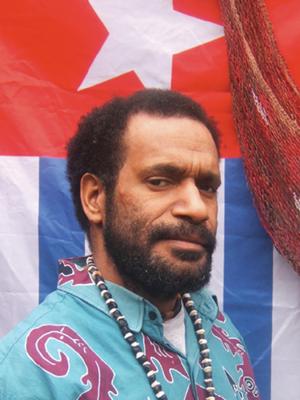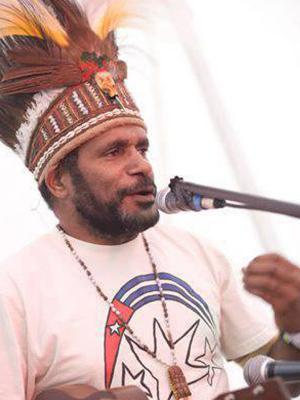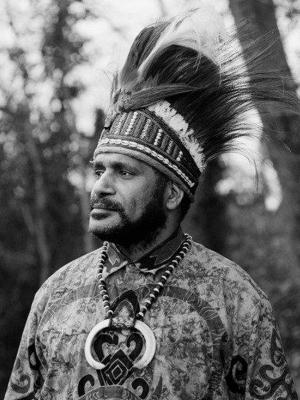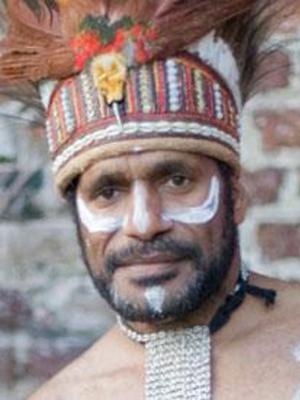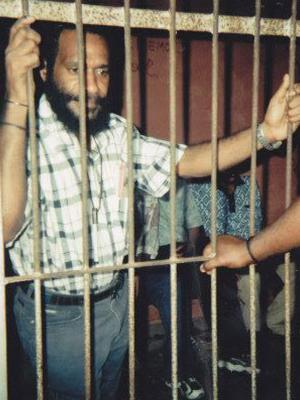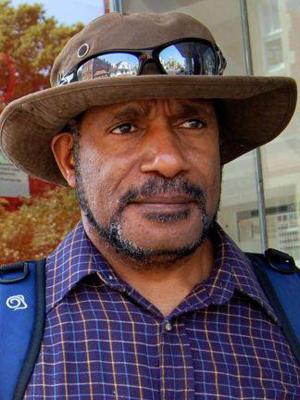benny wenda
and west papuan self-determination
article by i.t.a.
On 6th October three West Papuans scaled the wall of the Australian Embassy in Bali and delivered a letter demanding the release of 55 political prisoners in West Papua and that the province be opened to the international press.
There were reports that the embassy staff threatened the West Papuans with the Indonesian military. Eventually the three left in a taxi and the Indonesian military has been searching for them since.
“They should have helped and advised them but they listened to Indonesian advice rather than the Papuans,” said Benny Wenda, West Papuan independence leader and international lobbyist.
“Now they told me that three days ago they are still being intimidated by the Indonesian intelligence. The intelligence even went to every dormitory in Bali and Java. I’m still worried and concerned,” he said.
After the incident at the embassy, Australian Prime Minister Tony Abbot was quoted as saying that “people seeking to grandstand against Indonesia please don’t look to Australia, you are not welcome.”
Also he stated that “the situation in West Papua is getting better, not worse.”
“That’s according to Tony but for 50 years we’ve lived with Indonesia. We know exactly what they are doing and that they’re discriminating against West Papuans,” Wenda said, “The situation is not getting better. It’s becoming worse.”
Wenda states that at the time of the Second World War the West Papuan people supported and helped the Australian Army. He further believes that as this is a regional matter the Australian government has a moral imperative to assist the West Papuan people in their current situation.
“The Australian government has a moral obligation to support. This is a very close neighbour; you can’t ignore what happens next door. This is a regional issue and this issue is like a cancer for Australia,” Wenda said.
After the embassy incident there was speculation that West Papua would open to the International press with the Governor of Papua province, Lukas Enembe, stating that he welcomed foreign journalists and non-government organisations into the province.
Wenda said that although the governor has made this statement the province would not open to the international press as the Indonesian government would not allow this.
He further stated that the situation in the province at present was becoming more dangerous and that the West Papuan people’s freedom is restricted.
“The freedom of expression has been tightened. It is becoming really dangerous now in West Papua. Indonesia is really getting very worried because West Papua is becoming a hot topic internationally,” Wenda said.
Wenda, who now lives in exile in the United Kingdom, said that life for him in West Papua was very oppressive.
“When I was in West Papua I was physically and mentally intimidated every day. There’s no freedom, we are like slaves. We are like prisoners. In Europe there are cameras but in West Papua it is physical watching. The police intelligence, the military intelligence, it’s all double,” Wenda said.
“So you cannot be free because they are watching you. My life at the time, I didn’t have any freedom at all.”
Wenda was politically active when he lived in West Papua becoming the General-Secretary of Demmak, the Koteka Tribal Assembly.
It was due to his activism that he was eventually arrested and put on trial.
After his life had been threatened, he eventually escaped prison and fled the country in October, 2002.
“I didn’t have any plan to leave my people but because I was a leader and because I peacefully campaigned for self-determination they put me in prison and charged me 25 years without any evidence of my crime,” Wenda said.
“They just charged me and then they wanted to kill me in prison so I managed to escape and I came to the United Kingdom.”
Wenda now campaigns for West Papuan self-determination from the United Kingdom.
“Mainly at a grassroots level I raise awareness and on a political level I formed the groups International Lawyers for West Papua and International Parliamentarians for West Papua,” Wenda said.
“Mainly my focus is lobbying government to government, parliamentarian to parliamentarian. Also the lawyers investigate the Indonesian claim over West Papua under international law.”
In 1969 the UN brokered Act of Free Choice plebiscite was undertaken which resulted in a vote for West Papua to be integrated into Indonesia. The legitimacy of this vote is disputed by Wenda.
“Legally under international law we are the victim. That is why we need lawyers to look into that. Indonesia called it the Act of Free Choice. West Papuans call it the Act of No Choice,” Wenda said.
“That’s why it’s very important to really campaign for self-determination.”
Despite the great injustices experience by the West Papuans, Wenda does foresee positive developments on the horizon.
“I think my people are already coming out on the street. No one can stop it. Indonesia cannot stop us because we have already decided to be free.”
“We are becoming one voice towards self-determination. A lot of things will happen. That’s why I encourage the world to watch and keep an eye towards my people.”
check out the benny wenda site
